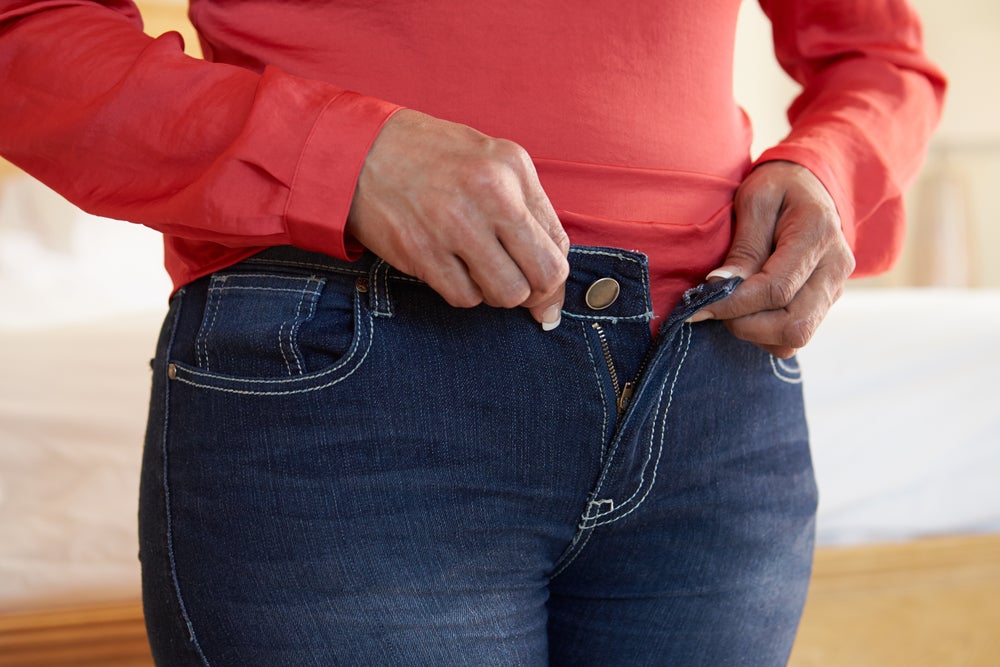Menopause and the Battle of the Bulge
An apple a day may keep the doctor away, but having an apple shape is likely to do just the opposite. A muffin top is no better. Thanks to menopause, your figure may be resembling one or the other.
Even if weight was never a concern in the past, you may have noticed a thickening around the middle that started when menopause came knocking. Your skirts and slacks may be feeling snug, and the numbers on the scale are slowly creeping up. The battle of the bulge has begun.
Be Honest
If you think about it, you may realize you haven’t been as diligent with your diet and exercise routine as you should be. After all, the symptoms of menopause can leave you too tired to put forth much effort for either. When it’s taking all of your energy just to get through the day, putting on your gym clothes to go out and sweat can feel overwhelming. Even changing into tennis shoes for a walk can look too hard. And let’s face it, if you’re tired it isn’t likely you are going to take the time to plan and prepare a healthy dinner. Going through the drive-thru on the way home may look far too appealing.
Being honest about your diet and exercise will let you make adjustments so you aren’t compounding the problem. You can choose better fats, healthier portions, and exercises that target the tummy. It might take some effort, but planning ahead can let you eat healthier meals and work in some exercises without extensive effort. On the plus side, the better you eat and the more you exercise, the more energy you may find you have for both as well as life in general.
Blame Menopause
But before you take all the blame, take a closer look at menopause. You may be doing all the right things, yet still finding your body is changing, and not for the better. Menopause really can be blamed for your emerging bulge.
Without enough estrogen to give it direction, your body starts making some new decisions. It’s not enough that it decides to slow down metabolism, it also decides to store more fat and to store that extra fat around your middle. It’s not fair.
Fight Back
You don’t have to take your body’s new agenda lying down. In fact, lying down is only going to make things worse. You need to get up and fight.
Using some hormone replacement therapy (HRT) to bring your estrogen levels up is an option. But there’s more. Along with a healthy diet and exercise plan, you need to stay vertical as much as possible. Sitting turns off an enzyme that helps your body burn fat, so stay on your feet as much as possible. And while you’re standing, try moving about. The more you move, the more calories you burn.
It’s also important to get enough sleep. The sleeping issues that go along with menopause can cause sleep deprivation that messes with your diet. Besides being too tired to exercise or stick to your diet, you may find you’re eating and drinking to stay awake. The calories in all those snacks, sodas, teas, and coffees add up, quicker than you may think. So create a better sleep routine, treat underlying sleeping problems, and stick to healthy snacks and glasses of H2O.
Finally, manage stress. Menopause alone can increase your stress level, but so can all the things that can happen to you around that age. Kids are moving away, parents are getting older, jobs may be changing, and retirement is getting closer. Whatever the cause, chronic stress triggers an increase in cortisol that left in your system long enough directs your body to store fat in your belly.
Talk to Your Doctor
Your doctor can be a big help when it comes to the battle of the bulge. She can do a physical and some lab work to be sure your extra weight is related to menopause and not an underlying health issue. She can advise you regarding HRT and its pros and cons for you. She can also help you work out a healthy diet and exercise program and keep you accountable so you’re more likely to stick with your plans.
This content was written by staff of HysterSisters.com by non-medical professionals based on discussions, resources and input from other patients for the purpose of patient-to-patient support. Reprinted with permission: Menopause and the Battle of the Bulge







